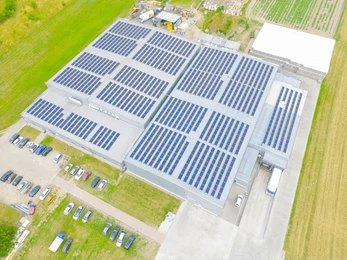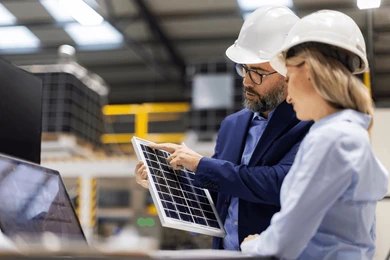Maximizing Energy Efficiency: How Much Power Can Industrial Solar Panels Produce?
As the world moves towards more sustainable energy solutions, businesses are increasingly turning to renewable energy sources like solar power. Solar energy has emerged as a powerful tool for industrial sectors seeking to maximize energy efficiency while reducing operational costs. But one question often arises: how much power can industrial solar panels produce? Understanding this is crucial for businesses to make informed decisions about their energy needs and investments.
This comprehensive guide will delve into the potential power output of industrial solar panels, explore the factors that impact their efficiency, and provide insights on how businesses can maximize their energy savings. By the end of this article, you’ll have a clearer understanding of the capabilities of industrial solar panels and why investing in them through Havasu Solar can be a game-changer for your business.
Understanding Industrial Solar Panels
Industrial solar panels are large-scale photovoltaic (PV) systems designed specifically for commercial and industrial use. Unlike residential solar panels, which typically serve a single household, industrial solar panels are engineered to power entire factories, warehouses, and commercial facilities. They come with higher wattage ratings, more advanced technology, and a larger installation footprint to meet the substantial energy demands of industrial operations.
Key Components of Industrial Solar Panels:
- Photovoltaic Cells: The core of any solar panel, these cells convert sunlight into electricity. Industrial panels use high-efficiency cells to maximize output.
- Inverters: Convert the direct current (DC) electricity generated by the panels into alternating current (AC), which is used by most industrial equipment.
- Mounting Systems: Designed to securely hold panels in place, mounting systems ensure optimal orientation and tilt to capture maximum sunlight.
- Monitoring Systems: Allow real-time tracking of solar panel performance, helping businesses identify and resolve inefficiencies quickly.
Investing in industrial solar panels from Havasu Solar means getting access to the latest technology and customized solutions designed to meet the unique energy needs of your business.
Factors Affecting Power Production of Industrial Solar Panels
Understanding how much power industrial solar panels can produce requires a closer look at the factors that influence their energy output. Here are some of the key considerations:
- Panel Type and Quality – The type and quality of the solar panels significantly affect their power output. Monocrystalline panels, known for their high efficiency and durability, are often preferred for industrial applications. Polycrystalline panels offer a more cost-effective solution but may have slightly lower efficiency. Thin-film panels are less common in industrial settings due to their lower energy output but can be suitable for specific environments.
- Geographical Location – The location of your facility plays a crucial role in determining the potential power output of your solar panels. Factors such as latitude, average sunlight hours, and local weather conditions directly impact the solar panels’ power output. For example, a business located in a region with long sunny days will generate more solar energy than one in a cloudy or rainy area. Havasu Solar, operating in sunny Arizona, benefits from optimal conditions for solar energy production.
- Panel Orientation and Tilt – The orientation and tilt angle of the panels are critical for maximizing solar energy power output. Panels should ideally face true south in the Northern Hemisphere and be angled according to the site’s latitude. Proper installation by experienced professionals, like those at Havasu Solar, ensures that your panels are positioned for maximum sunlight exposure throughout the year.
- Shading and Obstructions – Any form of shading—whether from trees, buildings, or other structures—can significantly reduce the efficiency of commercial solar panels. Even small shadows on one part of a panel can cause a disproportionate loss in energy output due to how solar cells are connected. Regular site assessments and strategic planning by experts at Havasu Solar help minimize shading issues and optimize panel placement.
- System Size and Capacity – The size and capacity of your solar panel system are fundamental to its power output. A larger system with more panels will naturally generate more electricity. However, it’s essential to design the system correctly to match the energy needs of your business. Havasu Solar specializes in designing tailored solar solutions that maximize output and efficiency while considering your unique energy requirements.
How to Calculate the Power Output of Industrial Solar Panels
Calculating the power output of industrial solar panels involves understanding several key metrics:
- Watts per Panel (W/panel): The power rating of individual panels, typically ranging from 250 to 600 watts for industrial panels.
- Kilowatts (kW) and Kilowatt-Hours (kWh): The total energy produced by the solar array. A kilowatt is a measure of power, while a kilowatt-hour is a measure of energy usage over time.
- Peak Sun Hours: The average number of hours per day when the sunlight intensity is strong enough for panels to generate maximum power.
Here’s a step-by-step guide to calculating your solar panel capacity:
- Determine the Solar Power Rating: Multiply the number of panels by the wattage per panel. For example, 100 panels with a rating of 400 watts each will have a total capacity of 40 kW.
- Calculate Daily Energy Output: Multiply the total system capacity by the average peak sun hours for your location. In a location with 5 peak sun hours, a 40 kW system would generate 200 kWh per day.
- Annual Energy Output: Multiply the daily output by 365 to estimate the annual solar panel energy output. In this example, the system would produce approximately 73,000 kWh annually.
By understanding these metrics, businesses can estimate their energy savings and the potential return on investment (ROI) from their solar panel installation.

Benefits of Maximizing Energy Efficiency with Industrial Solar Panels
Adopting solar energy offers numerous benefits for industrial and commercial businesses, particularly in maximizing energy efficiency:
- Cost Savings and ROI – By installing industrial solar panels, businesses can significantly reduce their electricity bills. The energy produced by solar panels offsets the need for grid electricity, resulting in substantial savings over time. With the right installation and maintenance, many businesses achieve a full return on their investment within 5 to 10 years. Havasu Solar provides customized ROI calculations, helping you understand your potential savings before making a decision.
- Reduction of Carbon Footprint – Switching to solar energy reduces your reliance on fossil fuels, leading to a smaller carbon footprint. This is not only beneficial for the environment but also enhances your company’s reputation as a responsible corporate citizen. Havasu Solar’s high-efficiency panels ensure maximum energy production with minimal environmental impact.
- Enhanced Energy Independence and Resilience – By generating your own electricity, you reduce your dependence on external energy suppliers, making your business more resilient to energy price fluctuations and grid outages. Industrial solar panels provide a reliable source of energy, especially when paired with battery storage solutions. Havasu Solar offers complete systems, including batteries, to ensure your operations run smoothly, even in power outages.
Best Practices for Maximizing Solar Panel Efficiency
To get the most out of your industrial solar panels, consider these best practices:
- Regular Maintenance and Cleaning – Dust, dirt, and debris can accumulate on panels and reduce their efficiency. Regular cleaning and maintenance are crucial to maintaining optimal solar panel watts per panel output. Havasu Solar offers maintenance services to keep your panels clean and functioning efficiently.
- Utilizing Solar Tracking Systems – Solar tracking systems adjust the orientation of panels throughout the day to follow the sun’s path. This increases the amount of sunlight captured and enhances the solar panel energy output. Havasu Solar provides advanced tracking systems tailored to your facility’s specific needs.
- Investing in High-Quality Inverters and Monitoring Systems – High-quality inverters are essential for converting the DC electricity generated by the panels into usable AC power efficiently. Monitoring systems help track performance in real time, allowing you to detect and resolve issues quickly. Havasu Solar uses state-of-the-art inverters and monitoring solutions to maximize your system’s efficiency.
- Optimal Installation and Use of Battery Storage – Pairing your solar energy power output with battery storage can store excess energy produced during peak sunlight hours. This stored energy can then be used during low sunlight periods or at night, ensuring a continuous power supply. Havasu Solar offers comprehensive solar-plus-storage solutions to meet your energy needs around the clock.
Future Trends in Industrial Solar Panel Technology
The field of solar technology is rapidly evolving, with several exciting trends on the horizon:
- Emerging Technologies – New advancements like bifacial panels (which capture sunlight from both sides) and perovskite solar cells (which offer higher efficiency and lower production costs) are set to revolutionize the market. These technologies promise to increase commercial solar panel efficiency significantly.
- Advancements in Energy Storage Solutions – As energy storage technologies improve, solar installations can store more power and become even more effective at providing consistent energy. Havasu Solar stays ahead of the curve, offering cutting-edge storage solutions that integrate seamlessly with our solar panel systems.
- Impact of AI and IoT – Artificial intelligence (AI) and the Internet of Things (IoT) are playing a growing role in optimizing solar energy systems. AI algorithms can predict energy production based on weather patterns, while IoT devices help monitor performance in real time. At Havasu Solar, we incorporate the latest AI and IoT innovations to ensure that your solar system operates at peak efficiency.
Conclusion
Industrial solar panels offer a powerful solution for businesses looking to maximize energy efficiency and reduce operational costs. By understanding the factors that impact solar panels’ power output and adopting best practices, companies can achieve significant energy savings and a strong return on investment. With the right technology and expertise, such as that provided by Havasu Solar, businesses can harness the full potential of solar energy.
Ready to take the next step towards energy independence and cost savings? Contact Havasu Solar today for a free consultation and discover how our tailored solar solutions can transform your business.




